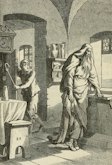The Pious Knight
A fairy tale by Ludwig Bechstein
Once upon a time there was a valiant knight who was honourable and pious, manly in combat, and godly at home. Whenever he rode out from his castle, or rode back home, the road took him over a large graveyard where the heathens of ancient days had burnt all their dead from that district and then inhumed their ashes in high mounds; later a battle had been fought there, and those who fell in the fight were likewise buried on that spot; in Christian times a God’s Acre Church had been built there, and a number of neighbouring village parishes had interred their deceased close to the church, also under the road that led to the knight’s castle. – Every time that the pious Knight rode to war, or returned home, he would say a prayer, as he passed by the Church of the Dead, for the repose of the departed.
Thus he rode, fearlessly and full of faith in God, over the silent graveyard at all times of the day or night, in the dark of night or in the clear moonlight which brightly illumined the white gravestones and cast a silver shimmer over the age-old colossal green mounds which lay along the side.
One day the pious Knight had set out and had attended to some affairs, and on his way home, around evening, a troop of enemies, who had been lying in ambush, suddenly attacked him in force. Although he was not in the least afraid, drawing his trusty blade and defending himself stoutly against his adversaries, yet he was but one man and they were many, so he had no other recourse than flight, to which end he swiftly turned his faithful steed around. But the whole troop of his pursuers was soon at his heels, savagely yelling and raging, and the fleeing Knight had to ride for his life; it was a Wild Hunt. Then the fugitive reached the field of the dead, riding over which he had so often uttered the prayer, “Out of the depths I cry unto thee, O Lord!”, the words of the one hundred and thirtieth Psalm, which is said so the dead may rest in peace, and for the forgiveness of sins. This time, however, the Knight was not able to say all of the Psalm; in his fear he could say only, “Out of the depths – out of the depths –” And behold, there rose from the depths – from the human graves – in droves, pale skeletons, mighty giants, the departed, and they raised weaponed arms and stood between the fleeing Knight and his enemies and pursuers, a wall of bones; and the pursuers felt a shuddering in their souls, while their horses shied and sprang back rearing.
The pious Knight came safely home to his strong castle, and never again did his enemies dare to lie in wait for him. The dead, for whom he had prayed, had gratefully, and faithfully, been his shield.
The New Book of German Fairy Tales

Notes: Translated by Dr. Michael George Haldane.
Contains 50 fairy tales.
Author: Ludwig Bechstein
Translator: Dr. Michael George Haldane
Published: 1856